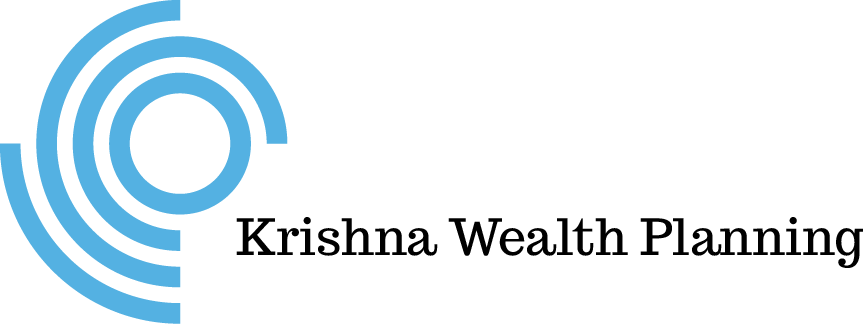7-Minute Read
While the Coronavirus pandemic continues to occupy our consciousness, a topic in recent client discussions at Krishna Wealth has been the potential tax planning opportunities stemming from the crisis. Some conversations directly relate to provisions in the recently passed CARES Act. But another question has been commonly asked: “Is now the right time to do a Roth IRA conversion?” Without diving deep into numbers, this piece looks at several situations to help provide insight and point you towards finding that answer. We’ll also review some often-missed factors to consider with this type of strategy.
Roth IRA Conversions – The What and the Why
Before jumping in, there are a few points to note at the onset:
· If you don’t know what a Roth IRA conversion is or how it mechanically works, here is one short piece that explains the basics.
· Why do a Roth Conversion? At the most fundamental level, deciding to do a Roth conversion is a tax planning decision. It’s a way of purposely creating income from your retirement assets and paying the taxes now. This is done with the intention of making tax-free distributions in the future when your tax rates might be higher.
· Not everyone is comfortable thinking in the realm of tax law, nor should they be. But Roth conversions can have a major impact on your finances, both positively and negatively. There’s often an element that impacts generational tax planning as well. So, before acting, please consider working with a financial advisor or tax professional.
Why Now Could Be a Good Time for a Roth Conversion
While not an exhaustive list, here are three situations where you might find that now is indeed the time to pursue a Roth conversion:
· Reduced Market Value of Retirement Assets – A sudden decline in the stock market, like we experienced recently in March 2020, could present a unique opportunity. Not that it’s possible to identify a market low point except in hindsight, you might feel that that converting assets into your tax-free “bucket” gives you a better chance to capture the gains from a subsequent market rebound and keep that gain free from future taxation. While this is a tactical decision subject to uncertainty, there is a piece from Dimensional Fund Advisors shows that US equity returns have historically been positive on average following sharp downturns. The file can be accessed here: History Shows That Stock Gains Can Add Up After Big Declines.
· Lower Income Expected – There can be several reasons why you might expect lower wage or business income. Due to the virus-related shutdowns in recent weeks, some common situations now are:
o Layoffs and Furloughs – This is tough if it applies to you, but we’re seeing this across many industry segments right now. Even when accounting for possible unemployment compensation, you might find yourself in a much lower projected tax bracket for this year. This may give you a unique opportunity to do a Roth conversion.
o Reduced Compensation – Some employers have not fully resorted to layoffs but have reduced employee wages in the hopes that it may be temporary and will get restored back to normal levels if/when the economy recovers. Such a situation could still put you in a lower than normal tax bracket.
· Recent Retiree – While this is a broad generalization, recent retirees often have some control over how they generate income, and by extension taxable income, in retirement. Partial Roth IRA conversions in early retirement years is often worth exploring. This may be an understatement as it is an essential checkpoint in the process used at Krishna Wealth Planning. Coupled with other strategies like delaying social security and controlling the timing of other retirement income sources, there can be opportunities for even more aggressive Roth strategies.
Why Now Might NOT Be the Right Time for a Roth Conversion
While there is an allure to having money in a tax-free account, we should be careful how and when we get there. Here are three situations where you might determine that postponing the Roth conversion will be in your best interest:
· Working but Still in a Relatively Higher Tax Bracket – As noted in the previous section, reduced compensation is a direct consequence of the times we’re living in. But you shouldn’t assume this automatically makes it a great time to do a Roth conversion. For example, a common situation for a relatively higher income earner is to have reduced compensation, but still project to be in the 24% marginal federal tax bracket. Their tax/cash flow projections might show them having most years in the future at an expected 12% tax bracket. When we run the numbers, which we won’t do here, we often see that they are still better off waiting to do their Roth conversions and possibly still maximizing their available pre-tax deductions now. However, if the main intention is to hedge the risk of higher than expected tax rates in the future, this may still be an acceptable tradeoff to proceed anyway with a conversion.
· Insufficient Cash Available to Pay the Taxes upon Conversion – Ideally a Roth conversion where you can pay the tax bill out of pocket (instead of paying from the converted assets themselves) has better leverage and results in more tax-free dollars working for you. So, if there is not enough cash or after-tax assets available to pay the tax bill, you may want to reconsider. In some cases, borrowing money to pay the tax bill could be explored, but that adds an additional complication and risk to manage in your strategy.
· Living in a state with a State Income Tax – The idea here is that Roth conversions are subject not only to Federal tax but state income taxes too. If this applies to you, it could impact your decision if you intend to move to a more tax-friendly state in the future or in early retirement. You might be better off delaying the Roth conversion until that time. This is one area that should be reviewed on a case-by-case basis as each state levies taxes in different ways.
Other Considerations Before Doing a Roth Conversion
Even if the initial indicators suggest it’s a good time to pursue a Roth conversion, there are some other conditions that might factor into your decision.
· Undoing a Conversion is Difficult – Say you implement a Roth conversion now and then change your mind. Your options are much more limited under current IRS rules. You no longer can “recharacterize” Roth conversions, which is basically just undoing the conversion and returning money back to the original pre-tax retirement account. Before those rules went into place, you had more flexibility if the value of what you converted dropped in value and/or your overall income turned out to be higher than what you expected. So, what do you do now? The risk of “over converting” can be partially mitigated by planning smaller Roth conversions spread out through the year. This gives you the option not to do conversions later in the year if your circumstances change. Or you might simply wait until closer to the end of the year where you may have more clarity on your income picture and where the financial markets stand.
· Expect to Make a Distribution Soon – If you are under the age 59 ½ and expect to take a distribution within 5 years, you may be subject to a 10% penalty on that distribution. While there a many nuances and exceptions in the tax code for this, you simply need to be careful if you plan to withdraw money recently converted to a Roth IRA.
· Simple IRAs Not So Simple (in one respect) – If you’re thinking about converting a Simple IRA to a Roth, be mindful of one rule. If conversion is being done within 2 years of the first contribution to the Simple IRA, the conversion is subject to a 25% penalty along with the ordinary income tax that would normally apply.
· Health Insurance Interactions – If you’re receiving a subsidy for health insurance premiums or paying Medicare premiums (Part B and D), you need to remember that your taxable income (which increases with a Roth conversion) can impact these. For those receiving a subsidy, the worst case is losing that subsidy if your taxable income reaches a certain level. For Medicare, you could face surcharges to your premiums that apply on a two-year lag.
· Required Minimum Distributions (RMDs) – Normally RMDs need to be taken before you can classify a retirement distribution as a Roth conversion. If you are subject to RMDs, this should always factor into your calculations. However, due to the recently passed the CARES Act, the requirement to take RMDs in 2020 has been suspended. This may create some additional flexibility for Roth conversions for this year only.
· Other Ways to Efficiently Increase Tax-Free assets – Roth conversions are not the only way to go. Some alternative strategies are covered in a previous piece on this blog called Seven Ways to Maximize Your Tax-Free Assets.
If you have comments or questions on this piece, please drop me a line at: [email protected]
References
1. https://taxfoundation.org/cares-act-senate-coronavirus-bill-economic-relief-plan/
2. https://www.investopedia.com/terms/i/iraconversion.asp
3. https://taxfoundation.org/state-individual-income-tax-rates-and-brackets-for-2020/
4. https://www.irs.gov/retirement-plans/ira-faqs-recharacterization-of-ira-contributions
5. https://www.medicare.gov/your-medicare-costs/part-b-costs
7. https://www.irs.gov/retirement-plans/simple-ira-plan-faqs-distributions
8. https://www.kitces.com/blog/2020-rmd-waived-cares-act-irs-notice-2020-23-fix-unwanted-rmd-rollover/
9. https://krishnawealth.com/seven-ways-to-maximize-your-tax-free-assets/
The information on this site is provided “AS IS” and without warranties of any kind either express or implied. To the fullest extent permissible pursuant to applicable laws, Krishna Wealth Planning LLC (referred to as “KWP”) disclaims all warranties, express or implied, including, but not limited to, implied warranties of merchantability, non-infringement, and suitability for a particular purpose.
KWP does not warrant that the information will be free from error. None of the information provided on this website is intended as investment, tax, accounting or legal advice, as an offer or solicitation of an offer to buy or sell, or as an endorsement of any company, security, fund, or other securities or non-securities offering. The information should not be relied upon for purposes of transacting securities or other investments. Your use of the information is at your sole risk. Under no circumstances shall KWP be liable for any direct, indirect, special or consequential damages that result from the use of, or the inability to use, the materials in this site, even if KWP or a KWP authorized representative has been advised of the possibility of such damages.
In no event shall KWP have any liability to you for damages, losses, and causes of action for accessing this site. Information on this website should not be considered a solicitation to buy, an offer to sell, or a recommendation of any security in any jurisdiction where such offer, solicitation, or recommendation would be unlawful or unauthorized.





